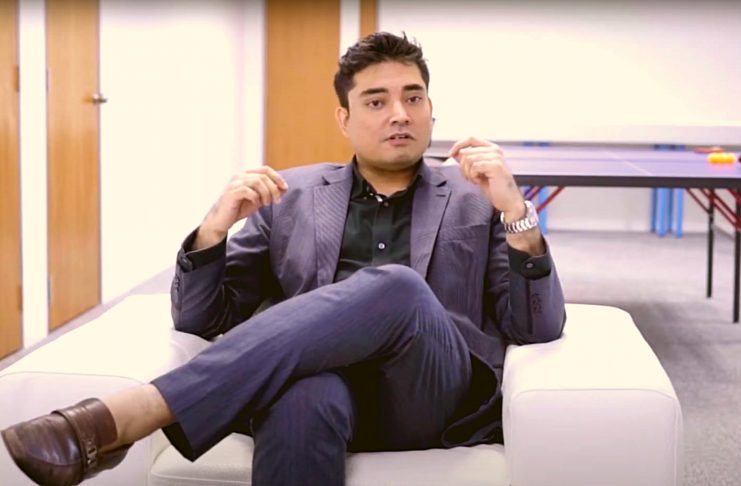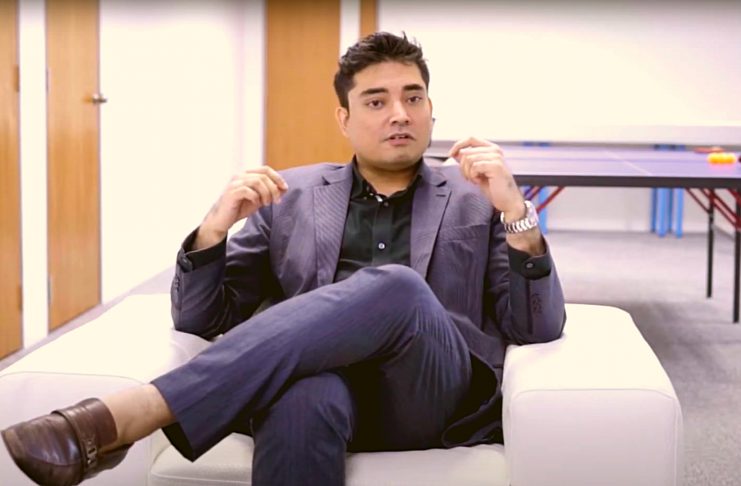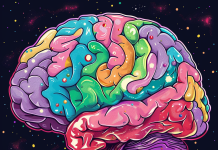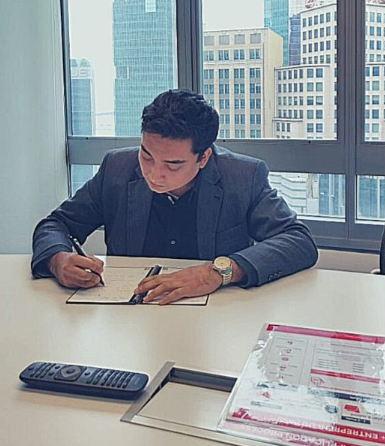The Mind Athlete: An Interview with Sancy Suraj, Memory Expert & Athlete!
Sancy Suraj is a memory expert and athlete from Singapore with an impressive track record in the field of memory and mental athleticism. He has set six memory records and represented Singapore at the world memory championships in 2011. Additionally, Sancy has been training in memory techniques for over 12 years and has taught more than 10,000 people worldwide how to improve their memory. In this interview, we explore Sancy’s unique perspective on mental athleticism and his strategies for developing mental resilience and focus.
How do you balance your training for memory techniques with your physical training as an athlete, and do you find that the two complement each other in any way?

As a memory expert and athlete, balancing my training for memory techniques with physical training is crucial. However, I do believe that the two complement each other in a few ways. One of the most significant benefits of physical training is that it helps to improve overall brain function, including memory. This means that when I am training as an athlete, I am also improving my memory indirectly.
On the other hand, my memory techniques training also helps me in my athletic endeavors. One example is visualization techniques, which I use to mentally rehearse my performances. I visualize every detail of the competition, including the environment, the equipment, and my movements. This helps me to build muscle memory and improve my performance, as I can recall the actions needed to execute the task at hand.
However, it is important to strike a balance between the two types of training. I prioritize my physical training during competition seasons, as I need to be in peak physical condition. During the off-season, I focus more on my memory techniques training, as it requires more time and mental energy.
I also find that my physical training helps me to stay focused and alert during my memory training sessions. When I am physically tired, I find it harder to concentrate on memory tasks. Therefore, by keeping myself in good physical shape, I can maintain my mental stamina and perform better during memory competitions.
In conclusion, while the two types of training may seem distinct, I believe that they are interrelated and complementary. By balancing my training and recognizing the benefits of each type, I can optimize my performance as both a memory expert and athlete.
Can you tell us about a time when you had to use your mental skills in a high-pressure situation, whether in competition or in another context?
Sure, I can definitely share a story about a time when I had to use my mental skills in a high-pressure situation. One of the most memorable moments was during the World Memory Championships in 2011. I was competing against some of the world’s best memory athletes, and the pressure was on to perform at my best.
During one of the events, we were given a deck of 52 playing cards and were asked to memorize the order of the cards as quickly as possible. I was focused and ready to go, but unfortunately, I made a mistake and misplaced a few cards in my memory palace. At that moment, I felt the pressure building up, and I knew I had to act quickly to recover.
With my mental skills in play, I took a deep breath, closed my eyes, and tried to recall as much as I could about the misplaced cards. I used visualization techniques to recreate the environment in my mind and to picture the cards in their correct positions. After a few moments of intense concentration, I was able to recover the misplaced cards and complete the task successfully.
This experience taught me the importance of staying calm under pressure and relying on my mental skills to overcome challenges. It also highlighted the power of visualization techniques and the effectiveness of using memory palaces to store and recall information quickly and accurately.
Overall, this experience was a reminder that mental skills are just as crucial as physical skills, especially in high-pressure situations. By relying on my mental abilities, I was able to recover from a mistake and perform well under extreme pressure.
What do you see as the most important mental skills for success as an athlete, and how do you train those skills in yourself?
As an athlete, I believe that there are several crucial mental skills that are essential for success. These skills include focus, determination, mental toughness, resilience, and visualization. While physical training is critical, these mental skills play an equally important role in helping athletes achieve their goals.
To train these skills in myself, I use a variety of techniques and strategies. One of the most effective techniques is visualization, which involves creating vivid mental images of the desired outcome. Visualization helps me to prepare mentally for competitions, build confidence, and reduce anxiety.
Another critical mental skill is focus, which is essential for maintaining concentration during competitions. To improve my focus, I use mindfulness techniques, such as meditation and breathing exercises. These practices help me to clear my mind, stay calm, and improve my ability to concentrate on the task at hand.
I also believe that mental toughness is critical for success as an athlete. Mental toughness is the ability to persist in the face of adversity, overcome obstacles, and remain committed to achieving goals. To develop mental toughness, I challenge myself regularly, both physically and mentally. I also use positive self-talk and affirmations to build confidence and resilience.
Finally, I believe that determination is essential for success as an athlete. Determination involves setting goals, working hard, and staying focused on achieving those goals, even in the face of setbacks or challenges. To develop determination, I set specific, measurable, and achievable goals and break them down into smaller steps. By focusing on these smaller steps, I can stay motivated and track my progress over time.
In conclusion, mental skills play a crucial role in achieving success as an athlete. By training skills such as focus, mental toughness, resilience, and visualization, athletes can prepare mentally for competitions, overcome obstacles, and achieve their goals. Through a combination of practice, training, and mental conditioning, athletes can develop these skills and improve their performance on the field or in the arena.
“Physical training builds the body, but mental training builds the athlete. Focus, determination, mental toughness, resilience, and visualization are the essential mental skills for success. By training these skills through techniques such as mindfulness, visualization, positive self-talk, and goal setting, athletes can achieve their goals and overcome any obstacle in their path to greatness.”
How do you incorporate mindfulness or meditation into your training as a mind athlete, and what benefits have you seen from those practices?
As a mind athlete, I believe that mindfulness and meditation are essential practices for training the mind and improving mental performance. I incorporate mindfulness and meditation into my training in several ways.
Firstly, I set aside time each day for meditation and mindfulness practice. I use this time to clear my mind, focus on my breath, and cultivate a sense of calm and relaxation. I find that this practice helps me to reduce stress, improve my concentration, and increase my ability to focus on the task at hand.
I also use mindfulness techniques during training and competitions. For example, when I’m memorizing a list of words or numbers, I focus on the present moment, let go of distractions, and immerse myself in the task. By practicing mindfulness in this way, I find that I’m able to stay focused and improve my recall.
Another way that I incorporate mindfulness into my training is through visualization. I use visualization techniques to create mental images of the desired outcome, such as a successful performance or achievement of a goal. By visualizing success in this way, I find that I’m able to build confidence and reduce anxiety, which can help me perform better under pressure.
The benefits of mindfulness and meditation for mind athletes are numerous. By training the mind in this way, athletes can improve their focus, concentration, and mental clarity, which can lead to improved performance. Mindfulness can also help athletes to reduce stress and anxiety, which are common obstacles that can interfere with mental and physical performance.
In conclusion, mindfulness and meditation are critical practices for mind athletes. By incorporating these techniques into training and competition, athletes can improve their mental performance, increase their ability to focus, and reduce stress and anxiety. Through regular practice and training, athletes can develop the mental skills necessary to succeed in their chosen sport or activity.
What advice would you give to someone who wants to improve their mental resilience or focus, whether for athletic performance or in other areas of their life?
My advice to anyone looking to improve their mental resilience and focus would be to start by developing a consistent practice of mindfulness and meditation. These practices are powerful tools for building mental strength and resilience, and can help to improve focus, reduce stress and anxiety, and enhance overall well-being.
In addition to mindfulness and meditation, it’s important to set clear goals and priorities and to develop a strong sense of purpose and motivation. This can help to maintain focus and discipline, even in challenging or high-pressure situations.
Another key aspect of developing mental resilience and focus is to cultivate a growth mindset. This involves embracing challenges and setbacks as opportunities for growth and learning, rather than as obstacles or failures. By adopting a growth mindset, individuals can develop a more positive and resilient outlook, and become more adaptable and resilient in the face of adversity.
Finally, it’s important to take care of your physical health and well-being, as this can have a significant impact on mental resilience and focus. This includes getting regular exercise, eating a healthy diet, getting enough sleep, and managing stress effectively.
In summary, to improve mental resilience and focus, it’s important to develop a consistent practice of mindfulness and meditation, set clear goals and priorities, cultivate a growth mindset, and take care of your physical health and well-being. With dedication and practice, anyone can develop the mental skills necessary to succeed in athletics, work, or any other area of life.
“Mindfulness and meditation are the weights we lift for our minds, building mental resilience and focus. Combined with clear goals, a growth mindset, and physical health, we can become champions in any area of life.”
Sancy discusses how he balances his training for memory techniques with his physical training as an athlete. He notes that while the two are different, they can complement each other. He explains that physical exercise helps to improve overall cognitive function and that memory training can help athletes to stay focused and motivated.
When asked about a time when he had to use his mental skills in a high-pressure situation, Sancy shares a memorable experience from his time competing in the world memory championships. He explains how he used visualization and association techniques to remember a long sequence of numbers, demonstrating the practical applications of memory techniques.
Sancy explains that the most important mental skills for success as an athlete are focus, motivation, and mental resilience. He highlights the importance of cultivating a growth mindset and setting clear goals and priorities. He also stresses the importance of taking care of physical health and well-being as this can have a significant impact on mental resilience and focus.
When asked about how he incorporates mindfulness or meditation into his training, Sancy shares his personal practices and the benefits he has seen from these practices. He explains that mindfulness and meditation help him to stay focused, reduce stress and anxiety, and improve overall well-being.
Finally, Sancy discusses his plans for continuing to push the boundaries of what’s possible in the field of memory and mental athleticism. He explains that he plans to stay up-to-date with the latest research and developments in the field, explore new applications of memory techniques, and continue refining his own training methods.
How do you plan to continue evolving and pushing the boundaries of what’s possible in the field of memory and mental athleticism?

As someone who is passionate about memory and mental athleticism, I’m always looking for new and innovative ways to push the boundaries of what’s possible in this field. One of the ways I plan to continue evolving is by staying up-to-date with the latest research and developments in neuroscience, cognitive psychology, and other related fields. This will help me to stay at the forefront of new breakthroughs and discoveries, and to incorporate these findings into my own training and teaching.
Another way I plan to continue pushing the boundaries is by exploring new and creative applications of memory techniques and mental athleticism. For example, I’m interested in applying these techniques to areas such as education, business, and even personal development. By finding new ways to use these skills in different contexts, I believe we can unlock even greater potential and impact.
Finally, I plan to continue refining and developing my own training techniques and methodologies, in order to help others achieve their own memory and mental athleticism goals. This involves constantly experimenting, testing, and iterating on different approaches, in order to identify the most effective and efficient methods for achieving success.
Overall, my goal is to continue pushing the boundaries of what’s possible in the field of memory and mental athleticism, and to inspire others to do the same. By staying curious, open-minded, and committed to growth and development, I believe we can continue to unlock new levels of human potential and achievement.
“Memory and mental athleticism are not just skills, but pathways to unlock human potential. To push the boundaries of what’s possible, we must stay curious, stay innovative, and stay committed to growth and development. With each breakthrough, we pave the way for the next generation to achieve even greater heights.”
Sancy Suraj’s unique perspective on mental athleticism provides valuable insights into the importance of mental resilience, focus, and mindfulness for success in athletics and other areas of life. His dedication to pushing the boundaries of what’s possible in the field of memory and mental athleticism is an inspiration to anyone looking to achieve their full potential.














